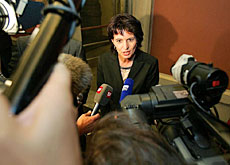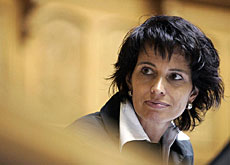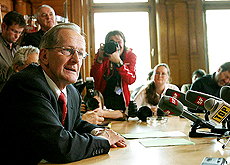Media circus adds spice to cabinet election

The resignation of cabinet minister Joseph Deiss and the election of his likely successor Doris Leuthard have been surrounded by a considerable media frenzy in Switzerland.
For some observers this is merely a sign of the times but for others the reams of column inches in the press have left a rather unsavoury taste in the mouth.
A resignation during the course of a legislature is still a rare event in Switzerland, and Deiss’s decision to step down on April 27 sparked a flurry of media speculation.
The economics minister from the centre-right Christian Democratic Party said he was leaving “freely, without pressure of any kind, while things were going well”. But others have suggested his departure is linked to personal circumstances or frictions within the cabinet.
In any case, Deiss’s surprise resignation – even his party had no inkling – appears to be part of a trend that has emerged in recent years.
“Cabinet ministers no longer pay much heed to the demands of the party they belong to,” Roger Blum, a professor at Bern University’s institute of communication sciences, told swissinfo.
This trend is deplored by Ruth Dreifuss, who as a minister represented the centre-left Social Democratic Party from 1993 to 2002. In her view ministers need some independence from their party in order to be able to seek consensus within the seven-strong cabinet.
“But there has to be a relationship of trust with the party, because the minister’s influence as a member of the government depends on the party’s strength and proactive approach in proposing policy,” she told swissinfo.
“No candidate gets elected to government without the party’s support. And even a minister’s departure needs to be agreed with the party.”
Time to go
According to Blum, a minister’s decision to resign depends far more now on his or her personality, age, health or the atmosphere prevailing within the cabinet. The decision may also be influenced by the fact that he or she has completed a spell in one ministry and a new appointment is looming.
Urs Altermatt, a historian and rector of Fribourg University, noted in a recent article published in the Neue Zürcher Zeitung that over the past 50 years media influence had also entered the equation.
“When [ministers] resign, they are increasingly likely to do it for personal reasons, so as to be the focus of media attention for a whole day,” he said.
But Dreifuss believes that “a cabinet minister should resist the temptation to seek personal attention, because it is not in keeping with membership of a government based on collective responsibility”.
Blum points out that over the past 25 years press coverage of ministerial resignations has undoubtedly become more intense.
“But the mechanism is always the same: extensive coverage on the day the announcement is made, and again the following day, when speculation as to who will succeed begins. If anything, as time has gone by, the media have increasingly indulged in this kind of speculation,” he said.
Political circus
Dreifuss warns against this development. “People dream of combining the advantages of the Swiss system with the ‘political circus’ you get in other countries. But the two things are incompatible.”
But Blum thinks it is unlikely that Switzerland is about to head further down the road towards more media froth and frenzy over the traditionally sedate world of Swiss politics.
He points out that parliamentary and cabinet elections in Switzerland do not carry the same potential for major policy swings as in other countries.
“Under our system parliamentary and government elections are not directly linked,” he emphasised. “A new parliament does not mean a new prime minister, and cabinet ministers are not the drivers of the electoral agenda.”
In fact, it is usually party chairs – not cabinet ministers – who appear on television to comment on the results of an election or popular vote.
swissinfo
Economics Minister Joseph Deiss’s decision to resign in mid-term took everyone by surprise.
The media have since been speculating on who will succeed him. Within the centre-right Christian Democrat Party, the unanimous choice is Doris Leuthard. She will be the sole candidate on June 14.

In compliance with the JTI standards
More: SWI swissinfo.ch certified by the Journalism Trust Initiative










You can find an overview of ongoing debates with our journalists here . Please join us!
If you want to start a conversation about a topic raised in this article or want to report factual errors, email us at english@swissinfo.ch.